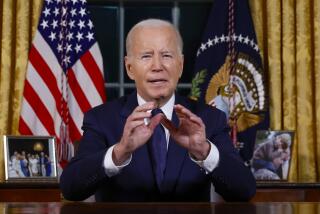We Must Break Out of the Failed ‘Saddam Trap’
- Share via
While the presidential candidates jockey to define their agendas, there is one issue on which both Al Gore and George W. Bush see eye to eye: Saddam Hussein must go.
While neither candidate has offered a precise plan on how to achieve this goal, it seems clear that regardless of who wins the White House, the next four years will see a continuation of America’s decade-long fixation on the president of Iraq.
The problem of Iraq is complex and vexing. Over the past eight years, the Clinton administration was trapped in a Saddam-centric policy of regime removal, which dictated the containment of the Iraqi dictator through economic sanctions regardless of the reality of Iraq’s disarmament obligation and the horrific humanitarian cost incurred by the people of Iraq. This policy has been an abject failure, a fact that has prompted much of the international community to start viewing Iraq and its leader more sympathetically. Whoever wins the election in November will face the daunting task of overcoming the Clinton legacy on Iraq: a hopelessly divided Security Council, an impasse on weapons inspections, a degenerating system of economic sanctions, the loss of American credibility and a resurgent Saddam Hussein.
Soon, weapons inspectors from the United Nations Monitoring, Verification and Inspection Commission (UNMOVIC) will try to resume inspections of Iraqi weapons facilities. Such inspections were stopped 20 months ago, in the aftermath of Operation Desert Fox and the resultant collapse of UNMOVIC’s predecessor organization, the United Nations Special Commission (UNSCOM). Iraq has rejected any cooperation with UNMOVIC as long as sanctions remain in place. The result is that, yet again, the Security Council will be confronted with a crisis regarding Iraq.
Three of the five permanent members of the Security Council--Russia, France and China--have made no secret of their sympathies toward Iraq and their opposition to America’s Iraq policy. The rest of the world appears more inclined to trade with Iraq than continue a pointless and morally bankrupt policy of economic sanctions. The fact that both major presidential candidates couch their justification for the continuation of economic sanctions on the grounds that Saddam Hussein is still in power and not on any sound assessment of Iraq’s weapons of mass destruction only further distances their respective positions from the rest of the world.
In fairness, the issue of Iraq’s weapons of mass destruction is no easy hurdle. Years of Iraqi obfuscation, lies and general lack of cooperation have made any unbiased assessment of its disarmament obligation virtually impossible. It is easy, given Iraq’s uneven record, to accept analysis based on speculation, rumor and hyperbole. This is the course that many, including Richard Butler, the former executive chairman of UNSCOM, have taken. The message of Iraq as “the greatest threat,” however overblown, is widely accepted in those corners prone to demonizing Iraq and Saddam Hussein.
The reality, however, is quite different. Rolf Ekeus, Butler’s predecessor as the head of UNSCOM, acknowledged that by 1995, Iraq had been “fundamentally disarmed” and that “all that remained were questions.” All of the major confrontations between UNSCOM and Iraq that took place between 1996 and 1998 concerned the search for documents and weapons components, not weapons or weapons production capability.
Iraq no longer possesses meaningful quantities of weapons of mass destruction or the means to produce such weapons. And yet Iraq continues to be punished by economic sanctions that have directly or indirectly led to the deaths of more than 1.2 million Iraqi civilians, primarily young children and the elderly. The justification for this tragedy lies not in Iraq’s disarmament obligation, which has been largely fulfilled, but rather in the policy of regime removal pursued by the United States. This policy has failed, and yet it represents the cornerstone of the thinking on Iraq for both Gore and Bush.
The Saddam Trap has foiled America’s Iraq policy for eight years, and unless both candidates are willing and able to break free of such Saddam-centric thinking and focus on the larger issue of Iraq, it will continue to ensnare America for the foreseeable future.
More to Read
Get the L.A. Times Politics newsletter
Deeply reported insights into legislation, politics and policy from Sacramento, Washington and beyond. In your inbox twice per week.
You may occasionally receive promotional content from the Los Angeles Times.








